ENEMIES OF ROME 6.8 - ARMINIUS - Long bridges and short sightedness
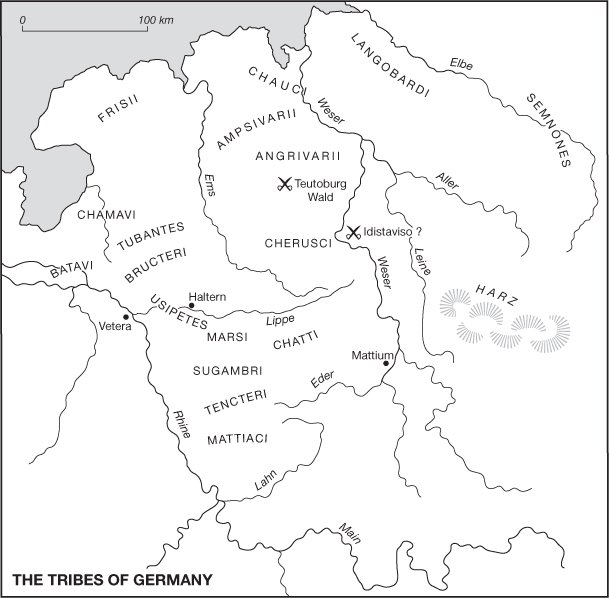
Soon after visiting the battlefield of Teutoburg, Germanicus’ legions almost met the same fate as Varus and there was a fair bit of family drama involving Arminius.
Battle of the Long Bridges
Now that they have witnessed the battlefield of Teutoburg where so many Romans had died and cleared their remains and elevated altars to their memory, the legions of Germanicus set about pursuing Arminius relentlessly - but it was not so easy, as Arminius favored a tactic of retreat and ambush, as says Tacitus:
Germanicus, however, pursued Arminius as he fell back into trackless wilds, and as soon as he had the opportunity, ordered his cavalry to sally forth and scour the plains occupied by the enemy.
The few skirmishes led to nothing and soon it was time to head for winter quarters. Taking the bulk of the legions with him, Germanicus went down the river and through the North Sea, while conferring a significant portion of his army to his subaltern Caecina to go by the quickest route to the Rhine - through the route known as the Long Bridges. These long bridges had been built during previous campaigns through marshes. They were badly damaged and Arminius, shadowing the retreating Romans, saw the opportunity when they started repairing them:
The barbarians attempted to break through the outposts and to throw themselves on the engineering parties, which they harassed, pacing round them and continually charging them. There was a confused din from the men at work and the combatants. Everything alike was unfavourable to the Romans, the place with its deep swamps, insecure to the foot and slippery as one advanced, limbs burdened with coats of mail, and the impossibility of aiming their javelins amid the water.
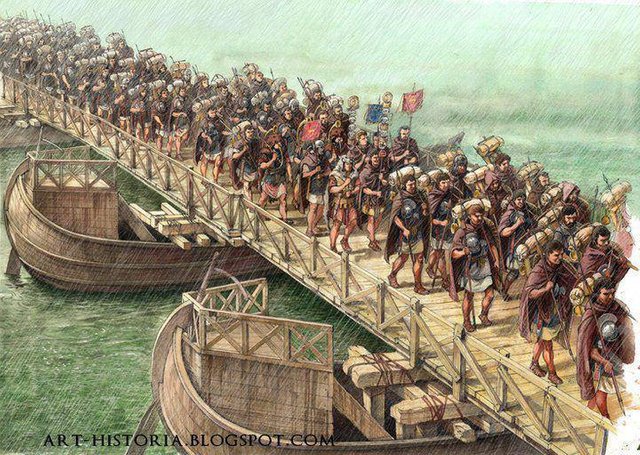
[Source]
After the first attack, the Romans owe their lives to the greed of the Germans who fall onto the pack animals and the baggage train, leaving the legion able to huddle into a makeshift camp:
Entrenchments had to be thrown up, materials sought for earthworks, while the army had lost to a great extent their implements for digging earth and cutting turf. There were no tents for the rank and file, no comforts for the wounded.
Meanwhile, the Germans argued about the next move, and this is where it shows that Arminius was maybe the most clever, but not necessarily the most listened chieftain in the lot. More often than not, his wise counsel was eclipsed by the greed of his fellow countrymen:
Arminius advised that they should allow the Romans to quit their position, and, when they had quitted it, again surprise them in swampy and intricate ground. Inguiomerus, with fiercer counsels, heartily welcome to barbarians, was for beleaguering the entrenchment in armed array, as to storm them would, he said, be easy, and there would be more prisoners and the booty unspoilt.
Attacking a Roman force on open ground, fortified, is never a good idea and the attack was shattered by the Romans decided not to follow in the footsteps of Varus:
Arminius and Inguiomerus fled from the battle, the first unhurt, the other severely wounded. Their followers were slaughtered, as long as our fury and the light of day lasted.
Caecina reached safety the next days to the great relief of Germanicus.
Dialogue of Arminius and Flavius
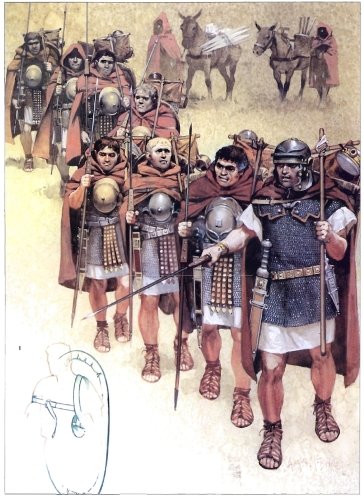
these were the Romans of Varus' army who had been the quickest to run, men who rather than face war had resorted to mutiny; half of whom were again exposing their spear-scored backs, half their wave and tempest-broken limbs, to a revengeful foe, under the frowns of Heaven and hopeless of success! For it was to ships and pathless seas they had had recourse, so that none might oppose them as they came or chase them when they fled.
During that invasion, Tacitus recounts a curious story, which may be pure fiction: at the Weser river, between the Roman and Cheruscan troops, a meeting was arranged between Arminius and his brother Flavius. Flavius had been hostage of Rome as well, but had never followed in the footsteps of Arminius and remained loyal to Rome. As one can expect, the meeting turned sour:
They now began to argue from their opposite points of view. Flavus insisted on "Roman greatness, the power of the Caesar; the heavy penalties for the vanquished; the mercy always waiting for him who submitted himself. Even Arminius' wife and child were not treated as enemies." His brother urged "the sacred call of their country; their ancestral liberty; the gods of their German hearths; and their mother, who prayed, with himself, that he would not choose the title of renegade and traitor to his kindred, to the kindred of his wife, to the whole of his race in fact, before that of their liberator."
In the end the brothers had to be physically restrained. There was to be no reconciliation.
The Battle of Idistaviso
After crossing the river Weser, Germanicus entered Cheruscan territory and met Arminius for battle at a place called Idistaviso. The place had been chosen by Arminius, whose forces occupied the high ground in the forest hills surrounding the plain. But Germanicus managed to send his cavalry to attack on the rear while his infantry was charging uphill and it had the desired effect:
Thus, remarkably enough, two columns of the enemy were following directly opposed lines of flight — the troops who had held the forest, rushing into the open; those who had been stationed in the plain, diving into the forest. Midway between both, the Cherusci were being pushed from the hills — among them the unmistakable figure of Arminius, striking, shouting, bleeding, in his effort to maintain the struggle.
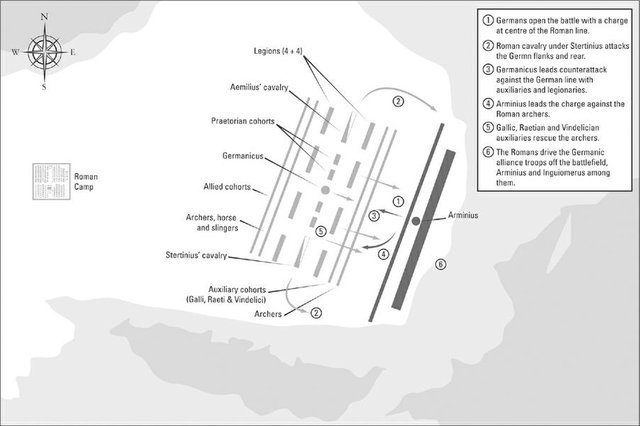
[Source]
In spite of his best efforts, Arminius could not hold the line and had to abscond - probably even wounded:
To avoid recognition, he had stained his face with his own blood; though, according to some authorities, the Chauci serving among the Roman auxiliaries knew him and gave him passage.
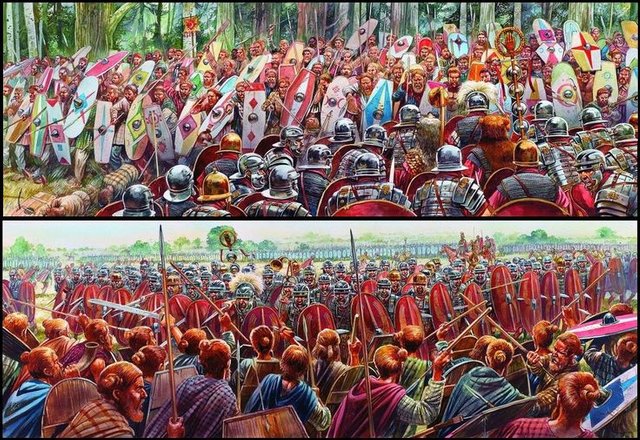
[Source]
The rout was total: Tacitus even mentions that the Germans were probably a little bit overconfident this time:
Among the spoils were found the chains which, without a doubt of the result, they had brought in readiness for the Romans.
Recall of Germanicus
The following year (17BC), Germanicus divided his forces to attack the Chatti on the one hand and the Marsi on the other. He decided to take on personally the Marsi, who, on his approach, made a hasty submission and tried to won him over by saying they knew where one of the eagle of Varus’ legion was kept…
It was another great victory for Germanicus, and it turned out it would be his last. Tiberius, as I explained, had been forced by Augustus to adopt Germanicus as his son and successor. More and more jealous of the successes and popularity of Germanicus, he insisted on his return to the capital.
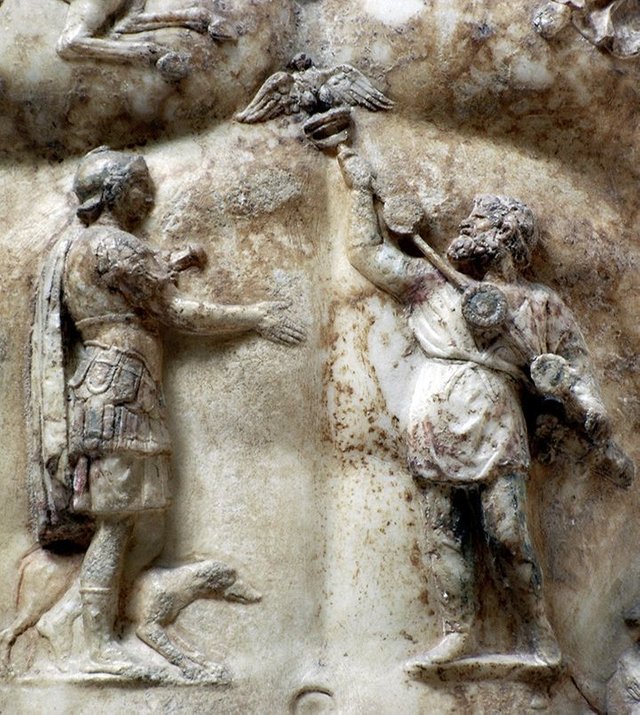
Tiberius presented with one of the lost eagle of Varus [Source]
Germanicus saw clear through Tiberius maneuvers. He could have then and there broken free of his allegiance and given a go at the Principate with the help of his legions, but he was loyal, if not to Tiberius, to the memory of the Divine Augustus… and relinquished his command to go back to Rome and assume an honorary consulship and enjoy a (somehow premature) triumph for his campaigns.
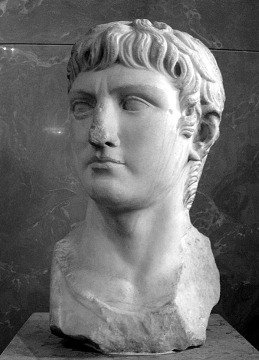 In the end, Arminius, who had lost the opportunity to win a great victory at the Long Bridges due to the short-sighted greed of his people, was saved by the short-sighted jealousy of the Roman Emperor himself and given an extra lease of time.
In the end, Arminius, who had lost the opportunity to win a great victory at the Long Bridges due to the short-sighted greed of his people, was saved by the short-sighted jealousy of the Roman Emperor himself and given an extra lease of time.

TO BE CONTINUED...Previous episodes:
ENEMIES OF ROME 6.7 - ARMINIUS - Revenge
ENEMIES OF ROME 6.5 - ARMINIUS - Give me back my legions!
ENEMIES OF ROME 6.4 - ARMINIUS - Teutoburg
ENEMIES OF ROME 6.3 - ARMINIUS - The Plot Thickens
ENEMIES OF ROME 6.2 - ARMINIUS - Pax Romana
ENEMIES OF ROME 6.1 - ARMINIUS - Magna Germania
Sources:
http://penelope.uchicago.edu/Thayer/E/Roman/Texts/Tacitus/Annals/1A*.html
http://penelope.uchicago.edu/Thayer/E/Roman/Texts/Velleius_Paterculus/home.html
http://penelope.uchicago.edu/Thayer/E/Roman/Texts/Velleius_Paterculus/2D*.html
http://penelope.uchicago.edu/Thayer/E/Roman/Texts/Cassius_Dio/home.html
http://www.sacred-texts.com/cla/tac/a01060.html
http://penelope.uchicago.edu/Thayer/E/Roman/Texts/Cassius_Dio/56*.html
very good
Thanks!
I hadn't checked steemit in a while. Glad to see this series is still going on.
Welcome back! And thanks!
Mate, this is a very good material for an entire History course! I'm following you!
Thanks :) Glad you like it!
Very surprised with your work of historical research. Bravo.
Doing my best! Truth is i didn't expect Arminius to take me so much time, but it looks it's gonna be a 10-episode one.
This post has been ranked within the top 50 most undervalued posts in the second half of May 02. We estimate that this post is undervalued by $5.57 as compared to a scenario in which every voter had an equal say.
See the full rankings and details in The Daily Tribune: May 02 - Part II. You can also read about some of our methodology, data analysis and technical details in our initial post.
If you are the author and would prefer not to receive these comments, simply reply "Stop" to this comment.